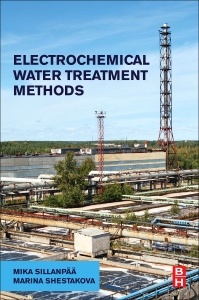Electrochemical Water Treatment Methods Fundamentals, Methods and Full Scale Applications
Auteurs : Sillanpaa Mika, Shestakova Marina

Electrochemical Methods for Water Treatment: Fundamentals, Methods and Full Scale Applications covers all traditional, emerging and combined methods currently available for the treatment of surface, drinkable water and industrial wastewater. Topics covered include an overview of pollutants and treatment methods, an extended introduction to electrochemical processes in water treatment, electrochemical oxidation (including electrodesinfection, electrochemical reduction, electrocoagulation, electroflotation, and electrodialysis. In addition, emerging and combined methods are presented, as is a discussion on the available equipment necessary to scale up the operation of all methods.
Electrochemical technologies have many common issues in terms of design, operation and performance. This book brings together a wealth of information on all different methods in a single source to provide broad insights and enable the connection between challenges and opportunities for different methods. The combination of technical information, design and case studies offered helps researchers better understand the challenges associated with scale up and implementation.
1. Introduction
1.1 Classification of Pollutants and Water Treatment Methods
1.2 Fundamentals of Electrochemical Processes in Water Treatment
1.3 Summary
2. Electrochemical Water Treatment Methods
2.1 Electrochemical Oxidation (Including Electrodisinfection
2.2 Electrochemical Reduction
2.3 Electrocoagulation
2.4 Electroflotation
2.5 Electrodialysis
2.6 Summary
3. Emerging and Combined Electrochemical Methods
3.1 Electrodeionization
3.2 Capacitive Deionization
3.3 Electro-Fenton Methods
3.4 Microbial Fuel Cells
3.5 Photoelectrocatalysis
3.6 Sonoelectrocatalysis
3.7 Summary
4. Equipment for Electrochemical Water Treatment
4.1 Electrochemical Reactors
4.2 Technological Solutions and Equipment Used in Electrocoagulation Process
4.3 Electroflotation Reactor
4.4 Examples of the Use of Electrochemical Water Treatment Methods in Practice
4.5 Summary
Environmental and Chemical Engineers, graduate students, researchers and consultants in water treatment
Mika Sillanpää’s research work centers on chemical treatment in environmental engineering and environmental monitoring and analysis. He received his M.Sc. (Eng.) and D.Sc. (Eng.) degrees from Aalto University, where he also completed an MBA degree in 2013. He has published more than 850 articles in peer-reviewed international journals. Dr. Sillanpää has received numerous awards for research and innovation. He is the first Laureate of Scientific Committee on the Problems of the Environment (SCOPE)’s Young Investigator Award, which was delivered at the UNESCO Conference in Shanghai 2010 for his “significant contributions, outstanding achievements, and research leadership in Environmental Technological Innovations to address present water pollution problems worldwide, especially with regard to wastewater treatment and reuse. He has supervised over 60 PhDs and has reviewed over 250 academic journals and published more than 1000 articles in peer-reviewed international journals. He has served on the editorial boards of several scholarly publications.
Dr. Marina Shestakova received a master’s degree in Environmental Engineering from the High School of Technology and Energy, Russia. After that, Dr. Shestakova continued her studies in Finland and received an MSc (Technol.) in Bioenergy Technology in 2010. In 2012, she began her PhD studies under the supervision of Prof. Sillanpää at the Lappeenranta University of Technology. She received her DSc degree in Green Chemical Technology in 2016. Dr. Shestakova has also conducted research work at the University of Alicante (Spain) and Coventry University (UK). Currently Dr. Shestakova works as a postdoctoral researcher in the Laboratory of Green Chemistry, Lappeenranta University of Technology. Her areas of interest include water treatment, environmental engineering, environmental remediation, renewable energy, nanocomposites, and nanomaterials
- Covers all electrochemical methods for water treatment
- Includes methods for the treatment of surface, drinking water and industrial wastewater
- Presents discussions on equipment in the context of scaling up the operation
Date de parution : 06-2017
Ouvrage de 310 p.
15x22.8 cm
Thèmes d’Electrochemical Water Treatment Methods :
Mots-clés :
Capacitive deionization; Case studies; Electrochemical reactors; Electrocoagulation reactors; Electrodeionization; Electro-Fento; Electroflotation reactors; Electrolyzers; Microbial fuel cells; Photoelectrocatalysis; Reactor calculations; Sonoelectrocatalysis; Three-dimensional electrodes



